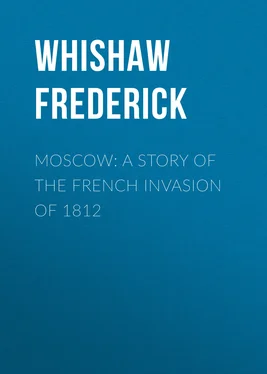Frederick Whishaw - Moscow - A Story of the French Invasion of 1812
Здесь есть возможность читать онлайн «Frederick Whishaw - Moscow - A Story of the French Invasion of 1812» — ознакомительный отрывок электронной книги совершенно бесплатно, а после прочтения отрывка купить полную версию. В некоторых случаях можно слушать аудио, скачать через торрент в формате fb2 и присутствует краткое содержание. Жанр: foreign_prose, История, foreign_edu, foreign_antique, на английском языке. Описание произведения, (предисловие) а так же отзывы посетителей доступны на портале библиотеки ЛибКат.
- Название:Moscow: A Story of the French Invasion of 1812
- Автор:
- Жанр:
- Год:неизвестен
- ISBN:нет данных
- Рейтинг книги:5 / 5. Голосов: 1
-
Избранное:Добавить в избранное
- Отзывы:
-
Ваша оценка:
- 100
- 1
- 2
- 3
- 4
- 5
Moscow: A Story of the French Invasion of 1812: краткое содержание, описание и аннотация
Предлагаем к чтению аннотацию, описание, краткое содержание или предисловие (зависит от того, что написал сам автор книги «Moscow: A Story of the French Invasion of 1812»). Если вы не нашли необходимую информацию о книге — напишите в комментариях, мы постараемся отыскать её.
Moscow: A Story of the French Invasion of 1812 — читать онлайн ознакомительный отрывок
Ниже представлен текст книги, разбитый по страницам. Система сохранения места последней прочитанной страницы, позволяет с удобством читать онлайн бесплатно книгу «Moscow: A Story of the French Invasion of 1812», без необходимости каждый раз заново искать на чём Вы остановились. Поставьте закладку, и сможете в любой момент перейти на страницу, на которой закончили чтение.
Интервал:
Закладка:
As for Vera, she felt forlorn and unhappy. She was not in the least in love, but for better or worse she had been accustomed lifelong to look upon this man as her husband-to-be, and now the air-castle had fallen in ruins. There was a sudden gap, an empty space in her life, and she felt lonely and deserted.
She actually cried over the matter and this did her a world of good. "He's certainly good-looking," was the conclusion she now arrived at; "but, as Constantine said, his vanity is terrible. I don't think I could have borne it!"
CHAPTER VII
A well-known establishment in a suburb of Paris, in the early part of last century, was the fencing-school of old Pierre Dupré, maître d'armes and retired Major in the French army. Old Pierre was growing somewhat old for the personal exercise of his art, but he could still superintend the practice of his pupils, who fenced with his assistants, and give such advice as they could receive from no other swordsman in all Paris.
Of assistants he had four, one a fine young fellow named Karl Havet, the second an equally excellent exponent of the beautiful art he taught, one Georges Maux. The other two helpers were, strange to say, females, strapping fine girls, both, and splendid swordswomen, old Pierre's daughters.
How it befel that his girls had become such adepts in their father's profession, and why, are matters easily explained.
It had been the greatest grief to the old man and a bitter grievance against destiny when, at the birth of his first child, he learned that he was the father of a girl. When the second and last child made its appearance and proved, like its sister, to be of the wrong sex, he was in despair. He had longed for a son to train in the use of arms which he should wield in his country's honour.
"Bring them up as boys," some one suggested, "they are fine girls both of them, and would make splendid boys."
From the moment that this idea took root in his mind, old Pierre found consolation. He adopted the suggestion in toto . The girls, while still young children, were dressed as boys, taught as boys, treated as boys, and perhaps almost, though not quite, loved as boys. From the earliest day upon which their little hands could hold and manipulate a rapier, he taught them to fence, and now—at the age of nineteen and twenty—the girls—Louise and Marie—could hold their own with almost any swordsman in Paris.
Though no longer dressed in male attire, old Pierre's daughters still wore garments as nearly allied to the fashion of those worn by men as was consistent with propriety. The girls looked as like men as handsome girls could look; they associated entirely with men, talked and thought like men, were men to all practical purposes, excepting in one particular: their women's hearts remained to them. One, Marie, was engaged to marry young Karl Havet, to whom she was devotedly attached, much to the chagrin of her father, who regretted Marie's "weakness" as a sad falling away from the state of grace to which his daughter had attained. To have been brought up as a man and to have reached the point of perfection, or near it, in the most manly of all exercises, and then to exhibit the weakness of a silly woman by falling in love—"Bah!" said old Pierre, in speaking of it to his friends, "it is sad—it is cruel—it is incredible!"
Nevertheless, the evil existed and must be recognised and put up with. The pair were engaged and within a month they would marry.
As for the second daughter, Louise, her father's favourite, his pride and joy—for not only was she a little taller, a little stronger, a little more skilful with the rapier than her sister, but also possessed the crowning glory, in his eyes, of a deep contralto speaking-voice, which added a point to her score of manly virtues—Louise, too, though Pierre guessed it not, had fallen a victim to the universal weakness of womankind; she, too, had lost her heart to a man. Louise did not tell her father this; she did not even tell Marie, her sister; it is probable that she did not whisper it even to her own heart of hearts, and yet she knew well that it was so: she was in love.
After all, it was no wonder that she should have become attracted by one or other of the many handsome and manly youths who came either to learn to fence or to practise the art, already learned, by engaging in a set-to with one of Pierre's accomplished daughters. Louise was acquainted with half a hundred of the most attractive young officers in Paris. Nearly every one of Napoleon's marshals had visited Pierre's establishment, nay, even the Emperor himself had been there and had laughed and applauded the skill of the two demoiselles d'armes . He had spoken to Louise and praised her to her face which was nearer the sky than his own by four inches at least.
Yet never, until a certain afternoon in this very year of 1812, had Louise been conscious of the quickening of her pulses in response to the instincts of womanhood; for though assuredly there were many of the gilded youths of her acquaintance who had wasted upon her the eloquence of the eye, of the whispering lips, of the tightened hand—all these things had left Louise as they found her, calm and unmoved, and wondering, maybe, at the foolishness of men who could waste time upon such silly matters as love-making and love-talking.
The fatal afternoon was that upon which young Baron Henri d'Estreville first visited the fencing establishment in order to see for himself the skill of the two girls with whose fame as swordswomen all Paris was ringing.
The Baron was himself a first-class swordsman, but in fencing a bout with Louise he distinctly had the worst of it, a fact which he was himself the first to admit.
This was a good-looking youth, merry and debonair, an officer in a Lancer regiment and the first cousin of one with whom we are already acquainted, Vera Demidof. He spoke with Louise both before and after the fencing match, and for some reason or another he took her fancy as no other man had done. D'Estreville was no exception to the rule of young men of his age. Louise was a woman, young and handsome, and of course the Baron employed against her all the artillery he possessed. Louise had thought this sort of thing only silly in others; but the whispered words, the meaning looks, the pressure of the hand appeared very charming when these measures were employed by her new friend.
The Baron said he would come again.
"You beat me handsomely to-day," he laughed, "but next time I intend to turn the tables; ah, Mademoiselle, it was not the rapier that overthrew me to-day, but the light of your eye, the beauty of your face–"
To his bosom friend and constant companion, Paul de Tourelle, the Baron said, "You must come down to Pierre Dupré's fencing establishment and see those girls of his fence. Also you should see Louise's eyes and complexion—by all that's bewitching, they are splendid! You shall admit it! As for her fencing–"
Young Paul de Tourelle laughed. "Yes, you shall take me to see them," he said; "I am anxious to know whether their skill is really so great as it is said to be by their admirers. As for her eyes and the rest of it, that sort of thing is not likely to have much effect upon me just now, for reasons well known to you."
"Poor Paul! nevertheless come and see; when a man is so hard hit as you seem to be this time, to gaze upon something equally attractive may do him good, just as a change of air is beneficial to a sick man."
"Equally attractive! beware what you say, my friend; such words savour of disrespect towards—some one; there is no one equally attractive, and cannot be; you speak of impossibilities."
"I retract the words," said the Baron, laughing; "we will say that here is a personality displaying remarkable attractions, falling short, however, of the highest. Joking apart, she is a splendid woman, strong as a man, handsome as one of the Graces, and she fences—well—even the great exponent Paul de Tourelle must look to his laurels if he measures swords with her."
Читать дальшеИнтервал:
Закладка:
Похожие книги на «Moscow: A Story of the French Invasion of 1812»
Представляем Вашему вниманию похожие книги на «Moscow: A Story of the French Invasion of 1812» списком для выбора. Мы отобрали схожую по названию и смыслу литературу в надежде предоставить читателям больше вариантов отыскать новые, интересные, ещё непрочитанные произведения.
Обсуждение, отзывы о книге «Moscow: A Story of the French Invasion of 1812» и просто собственные мнения читателей. Оставьте ваши комментарии, напишите, что Вы думаете о произведении, его смысле или главных героях. Укажите что конкретно понравилось, а что нет, и почему Вы так считаете.












